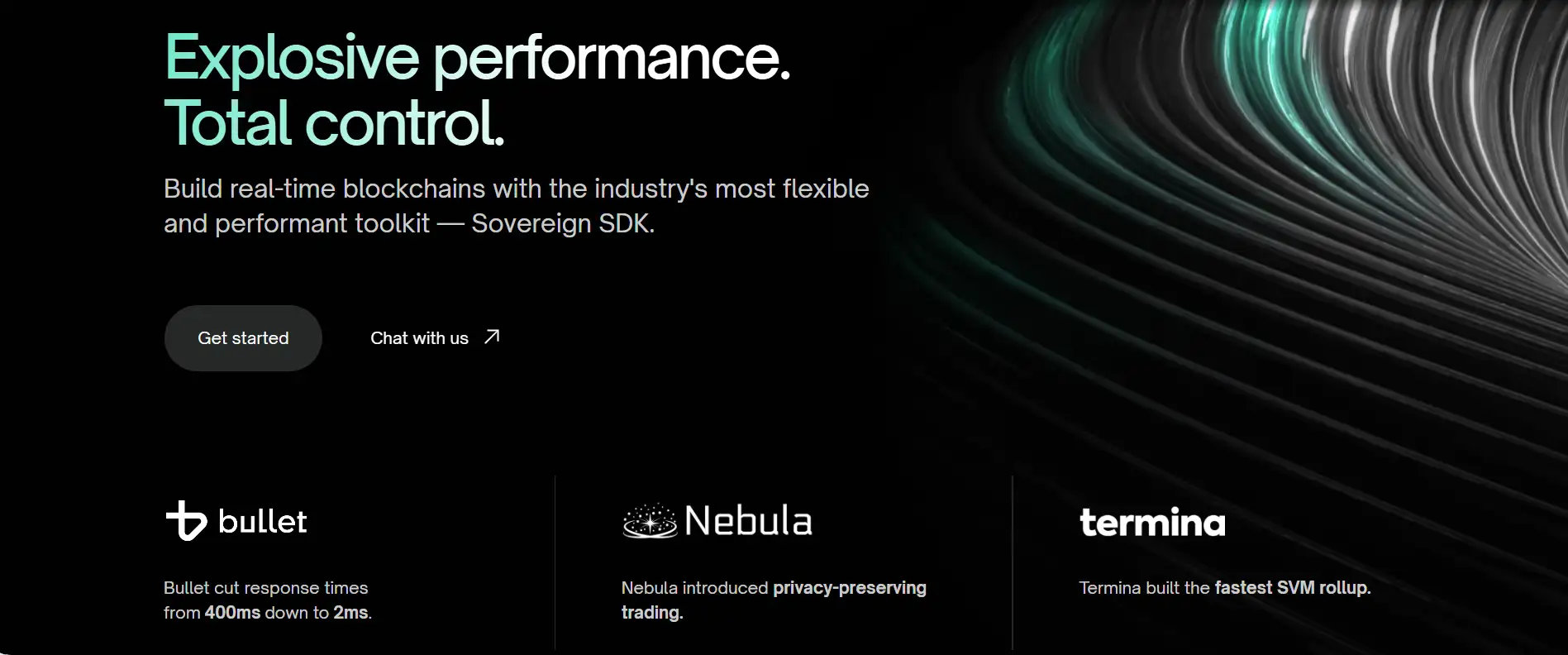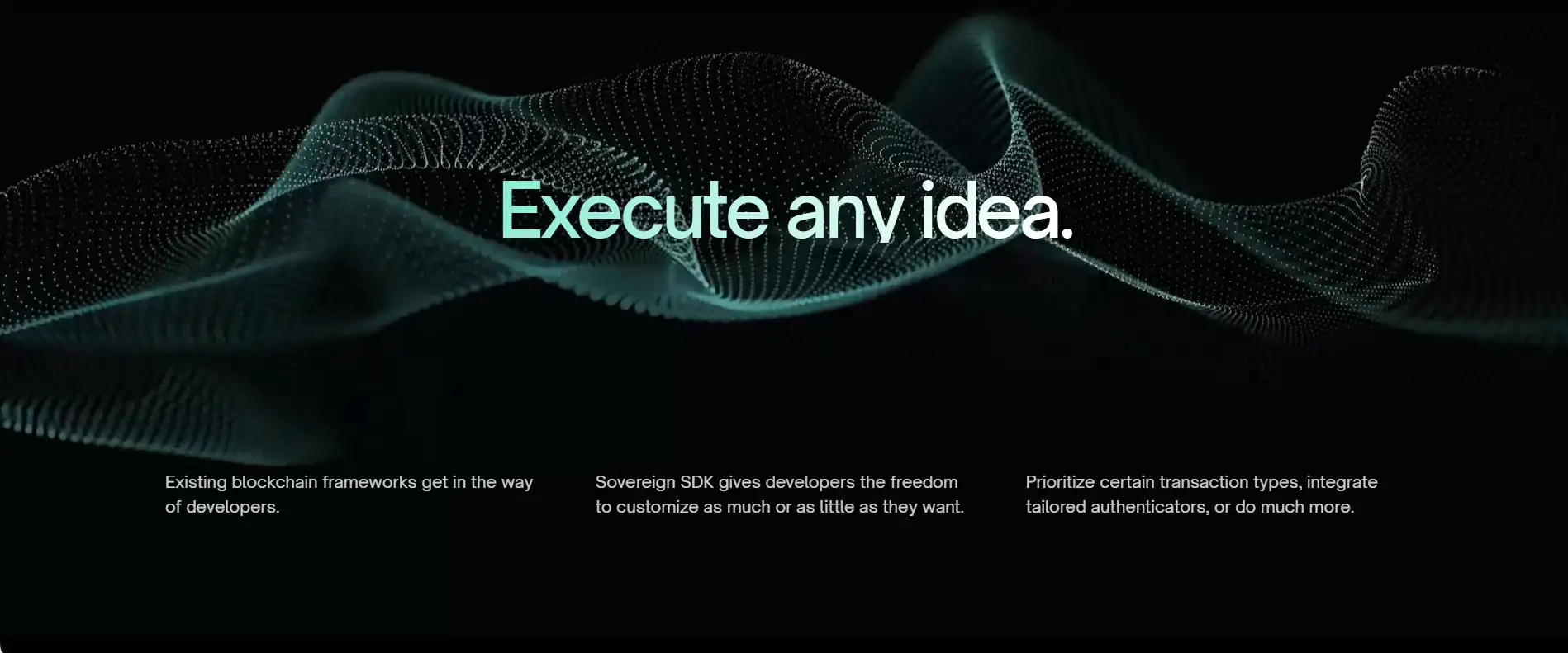About Sovereign Labs
Sovereign Labs is the team behind the Sovereign SDK, an ultra-flexible and high-performance framework that enables developers to build customized, real-time blockchain rollups with ease. Designed specifically for use cases demanding low latency and deep control, the Sovereign SDK gives builders the ability to fully customize execution logic while achieving industry-leading transaction speeds of 2-5ms.
The SDK is written in Rust and provides everything developers need to move from idea to production—including REST and WebSocket APIs, event indexing, and sequencer failover. With a modular, future-proof architecture, Sovereign enables total freedom over data availability layers, zkVMs, and execution environments—allowing teams to scale, pivot, or optimize without being locked into legacy frameworks. Whether you're building high-performance DeFi, gaming infrastructure, or novel appchains, Sovereign Labs is redefining what’s possible in blockchain architecture.
Sovereign Labs was created in response to a growing limitation in blockchain infrastructure: existing general-purpose frameworks force all applications to compete for the same execution layer, limiting speed, customization, and overall developer experience. The Sovereign SDK solves this by enabling developers to build dedicated rollups that give their apps complete execution freedom, custom logic, and access to exclusive throughput.
Unlike traditional L1 blockchains or even modular L2 stacks like the Arbitrum Orbit or OP Stack, Sovereign delivers unmatched performance. Benchmarks show P99 transaction confirmations under 10ms and throughput exceeding 4,500 TPS, enabling even complex architectures like on-chain Central Limit Order Books (CLOBs) to function in real time. Systems built with Sovereign outperform legacy stacks like Solana and Cosmos SDK in both responsiveness and architectural flexibility.
The architecture behind Sovereign is based on a two-stage model. In the first phase—real-time execution—transactions are submitted to a sequencer, which executes them instantly and returns a soft confirmation in as little as 2ms. These results are responsive enough to match traditional web app performance. In the second phase—on-chain settlement—transactions are batched and posted to a Data Availability (DA) layer such as Celestia, then verified via cryptographic proofs (zk-rollups) or attestations (optimistic rollups). This design gives builders both the speed of centralized systems and the security of decentralized consensus.
Because it is fully modular, the Sovereign SDK allows developers to choose their own DA layers, execution engines (zkVMs), authenticators, and transaction prioritization logic. The framework includes built-in support for indexing, real-time metrics tracking, RESTful APIs, Swagger UI, and automatic sequencer failover—making it one of the most developer-friendly rollup frameworks available.
Sovereign Labs is supported by respected names in the industry, including backers like Balaji Srinivasan, Tim Beiko, James Prestwich, Eric Wall, Zaki Manian, and many others. Applications like Bullet and Nebula have already used Sovereign to build privacy-preserving, latency-sensitive blockchain systems. Compared to other modular solutions like Fuel or Polygon CDK, Sovereign Labs offers faster execution, deeper customization, and far lower switching costs—enabling developers to remain agile in an ever-evolving web3 landscape.
Sovereign SDK offers an extensive list of features and benefits that make it the ideal choice for building next-gen rollups:
- Ultra-Low Latency: Achieve soft-confirmation times between 2–5ms, outperforming even the fastest L1 and L2 chains.
- High Throughput: Handle more than 4,500 transactions per second on standard hardware—ideal for DeFi, gaming, and real-time applications.
- Modular Architecture: Customize execution logic, fee models, DA layers, zkVMs, and authentication flows—all with minimal code overhead.
- Built-in Developer Tools: Instantly access REST APIs, WebSocket endpoints, OpenAPI specs, and a full-featured indexer for your application data.
-
Rust-First Framework: Write your rollup logic using idiomatic Rust. Build and deploy with
cargo build—no need for deep blockchain expertise. - Seamless Integration: Connect to any chain, enable click-to-sign UX, and track metrics in real-time with native logging and monitoring.
- Platform Agnostic: Migrate from another rollup or change your zkVM/DA stack with just a few lines of code—eliminating long-term lock-in risks.
- Proven in Production: Used by high-performance projects like Bullet and Termina to power cutting-edge blockchain infrastructure.
Sovereign Labs makes it simple to start building high-performance rollups using the Sovereign SDK. Here’s how you can get started:
- Visit the Website: Go to sovereign.xyz to access the Sovereign SDK, documentation, blog, and ecosystem updates.
- Read the Docs: The complete developer guide is available at sovereign.xyz/docs, including how-to guides for deploying your first rollup.
- Install the SDK: Start building by writing your business logic in Rust. Use the provided CLI to generate your node implementation and sequencer automatically.
- Configure Your Environment: Choose your preferred data availability layer and zkVM, and configure authentication, fee logic, and transaction handling.
- Deploy & Test: Use built-in WebSocket and REST endpoints to interact with your rollup, track logs, and measure performance.
- Use Real-Time Metrics: Monitor transaction flows, API calls, and events using the built-in native indexer and analytics tools.
Sovereign Labs FAQ
The Sovereign SDK achieves its speed through a combination of architectural optimizations and real-time execution design. Transactions are soft-confirmed in 2–5 milliseconds using a proprietary sequencer architecture that executes transactions before batching them to the Data Availability (DA) layer. This is backed by a state-of-the-art storage engine and modular Rust runtime, which eliminates overhead found in frameworks like Cosmos SDK or OP Stack. The result is 4,500+ TPS throughput and P99 under 10ms, giving developers web-level performance for on-chain systems. Learn more at sovereign.xyz.
Yes. One of the major advantages of the Sovereign SDK is its future-proof modularity. Developers can migrate from existing frameworks such as OP Stack, Arbitrum Orbit, or Cosmos SDK with minimal refactoring. The SDK’s plug-and-play design allows you to swap out DA layers, zkVMs, or execution environments without rewriting your entire application logic. Sovereign’s migration tools streamline this process, ensuring minimal downtime and full compatibility with your existing smart contract stack.
No. The Sovereign SDK was designed for Rust developers rather than traditional blockchain engineers. If you’re comfortable writing backend logic in Rust, you can build and deploy a full rollup with
cargo buildand the SDK’s CLI tools. The system automatically generates REST APIs, WebSocket endpoints, and OpenAPI specifications for your state variables. This allows teams without deep blockchain experience to build production-ready rollups with minimal setup.Sovereign Labs implements a two-stage verification process combining high-speed sequencing with decentralized settlement. Transactions are first executed and soft-confirmed in real time, then periodically committed to a Data Availability (DA) layer like Celestia. Depending on configuration, developers can choose between zk-rollup mode (using cryptographic proofs) or optimistic-rollup mode (using attestations). This ensures both speed and verifiability—offering instant user feedback while maintaining trust-minimized state validation on-chain.
The Sovereign SDK is ideal for projects that require real-time interaction, high throughput, and customizable execution logic. These include DeFi protocols (such as DEXs or derivatives), on-chain order books, gaming applications, AI coordination systems, and even infrastructure rollups that power other chains. The framework’s modularity lets teams tailor performance, fees, and data management to their exact needs. Explore real-world examples like Bullet and Termina built on Sovereign at sovereign.xyz.
You Might Also Like












